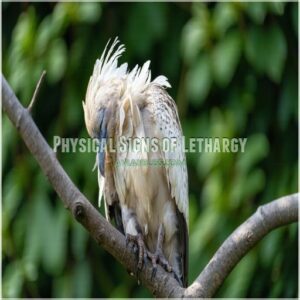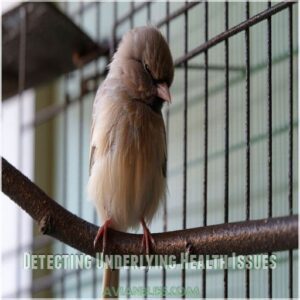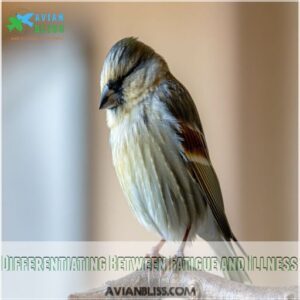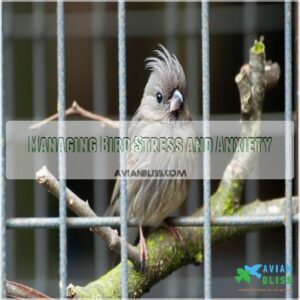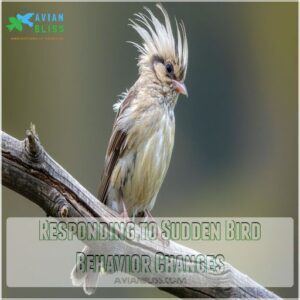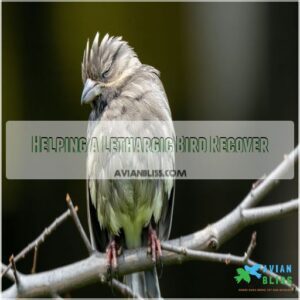This site is supported by our readers. We may earn a commission, at no cost to you, if you purchase through links.

But if it’s consistently sluggish, keep an eye out for health issues like infections or nutritional deficiencies.
Birds can get stressed with changes in their environment, which might make them seem out of sorts.
On the flip side, boredom can make a bird lethargic too; after all, who wouldn’t feel blah without a little excitement?
Think of it as your feathered friend’s cry for help.
To unravel this mystery, let’s explore some intriguing insights ahead.
Table Of Contents
- Key Takeaways
- Recognizing Lethargy in Birds
- Why is My Bird Acting Lethargic
- Common Causes of Lethargy in Birds
- Identifying Bird Illness Symptoms
- Detecting Underlying Health Issues
- Differentiating Between Fatigue and Illness
- Managing Bird Stress and Anxiety
- Maintaining a Healthy Bird Environment
- Responding to Sudden Bird Behavior Changes
- Helping a Lethargic Bird Recover
- Frequently Asked Questions (FAQs)
- What are the symptoms of anorexia & lethargy in birds?
- Is a sick bird a sign of ill health?
- Do birds get sick overnight?
- Are tame birds sick?
- How long does it take a bird to get sick?
- Do birds show signs of illness?
- Why is my bird acting weird all of a sudden?
- What do you give a lethargic bird?
- Why is my bird suddenly sleepy?
- What are the symptoms of a bird stroke?
- How do I prevent bird lethargy?
- What diet changes help combat lethargy?
- Are there natural remedies for bird lethargy?
- Can seasonal changes affect bird energy levels?
- How does a vet diagnose bird lethargy?
- Conclusion
Key Takeaways
- Keep an eye on your bird’s behavior and appearance for signs of lethargy, like reduced activity or changes in vocalization, as these could indicate health issues.
- Act quickly if you notice persistent lethargy by consulting an avian vet to diagnose potential illnesses or stress factors affecting your bird.
- Maintain a healthy environment with regular cleaning, fresh food and water, and enrichment activities to prevent lethargy and promote well-being.
- Monitor and adjust your bird’s diet to ensure it gets balanced nutrition, and provide social interaction and a safe habitat to manage stress and anxiety levels.
Recognizing Lethargy in Birds
When your feathered friend starts acting like the world’s tiniest couch potato, it might be experiencing lethargy.
Keep an eye out for changes in behavior or appearance, as these could be clues your bird isn’t feeling its best.
What is Lethargy in Birds
Lethargy in birds isn’t just about being a sluggish bird.
It’s when your feathered friend acts unusually tired or withdrawn, hinting at possible underlying health issues.
Maybe you’ve noticed your bird is more of a couch potato lately, lacking its usual chirpy enthusiasm.
This could signal a range of concerns, from mild to serious, needing keen observation and care.
Behavioral Changes in Lethargic Birds
Ever notice how your bird’s usual chirps turn into long silences or aggressive squawks?
It’s like they’re trying to tell you something’s off.
Changes like feather ruffling, a loss of appetite, or abandoning favorite perches signal a lethargic bird.
These abnormal behaviors reveal underlying bird behavior problems, much like an unexpected guest overstaying their welcome requires immediate attention.
Physical Signs of Lethargy
Notice your bird fluffed up like it’s guarding a secret? A ruffled plumage isn’t just a bad hair day—it’s a hint.
Droopy wings and decreased activity spell trouble.
If your bird is sleeping excessively, it could be an indicator of parrot illness, as discussed in the warning signs of parrot not eating and sleeping a lot.
Weight loss screams "call for help," especially if your bird’s not eating or drinking.
If it’s breathing heavily, you might need to play detective—and fast.
Trust your instincts!
Why is My Bird Acting Lethargic
Why is your bird acting lethargic? You might wonder if it’s just tired or if something’s up. Bird Health encompasses more than just what meets the eye. If you notice a persistent lack of energy or changes in activity, it could be a sign of stress or illness, so it’s important to monitor vocalization patterns and behavior.
Keep an eye out for these signs:
- Behavior shifts like mood swings or lack of interest.
- Changes in Diet, such as eating less or losing weight.
- Sleeping too much or appearing weak and sluggish.
- Bright, engaging vocalizations turning into silence.
Seeing any of these? It’s time to think about visiting a vet to make sure your feathered friend’s well-being.
Common Causes of Lethargy in Birds
Lethargy in birds can stem from several issues, so it’s important to understand the common culprits.
Think of it like us humans – sometimes a bad night’s sleep makes us sluggish, but other times, it’s a sign of something more serious.
Respiratory Issues and Infections
Respiratory infections like Bird Flu and Avian Pox can turn breathing difficulties into a real squawk.
If your feathered friend shows labored breathing or other respiratory symptoms, it might be time to visit an avian vet.
They’ve got the treatment options to get your bird chirping again.
Here’s a quick rundown:
| Symptom | Possible Cause | Action Needed |
|---|---|---|
| Labored Breathing | Respiratory Infection | Visit Avian Vet |
| Wheezing | Avian Pox | Seek Immediate Help |
| Open-mouth Breathing | Bird Flu | Emergency Treatment |
| Tail Bobbing | Respiratory Issues | Monitor, Seek Advice |
| Sneezing | Environmental Factors | Clean and Ventilate |
Digestive Problems and Intestinal Blockages
If your bird’s looking a bit down and not eating or drinking, digestive problems like intestinal blockages might be to blame.
Imagine trying to enjoy life with a rock in your tummy—ouch!
Keep an eye out for impaction symptoms and loss of appetite.
Prevention tips and treatment options are key.
Prompt attention can shorten recovery time, ensuring your feathered friend feels better quickly.
Fungal and Bacterial Infections
Fungal and bacterial infections can sneak up on your feathered friend, turning them into lethargic birds.
Identifying symptoms early, like unexpected weight loss or those dreaded fluffed feathers, is key.
To boost avian health, hone in on prevention by keeping their home clean and cozy.
If your bird’s acting oddly, don’t dawdle—get a diagnosis from the vet pronto!
Nutritional Deficiencies and Dehydration
Nutritional gaps can make your bird weak and extra sleepy.
Imagine eating nothing but junk food—you’d feel off too!
Common deficiencies, like calcium and vitamin A, often result in a bird not eating or being less lively.
Keep an eye on water intake; signs of dehydration include a bird not drinking, tired, and lethargic.
A balanced diet for healthy birds with enough supplements might just perk them up!
Identifying Bird Illness Symptoms
When your bird starts acting like it’s auditioning for a role as a couch potato, it might be showing signs of illness.
Keeping an eye out for changes in its chirping, eating, or feather puffiness can help you catch problems early and keep Polly cheerful.
Changes in Vocalization and Activity
Is your bird unusually quiet or sitting still more than usual?
These behavior changes can signal illness, and in some cases, may be related to a parrot stopped talking due to health issues or environmental stressors such as new homes and noise overload.
Sometimes, chirping patterns shift — a once chatty bird may turn silent or a quiet bird might become noisier.
Lethargy often follows.
Keep an eye on these vocalization and activity levels; they’re your bird’s way of speaking up about their health.
Changes in Appetite and Droppings
Okay, so you’ve noticed changes in your bird’s chirps and activity levels.
Now, let’s look at their eating habits and what’s coming out the other end!
Appetite loss? Weight loss? Changes in dropping frequency, color, or consistency? Food in their droppings? Watery droppings are never good.
These details, alongside behavioral changes, can help your vet figure out what’s going on. Don’t ignore these clues!
Abnormal Feathers and Skin Changes
Ever noticed your bird acting a bit off, with their feathers looking rough or thin?
Feather plucking, feather damage, and molting can point to health issues.
Skin infections and irritation might also be at play, leading to feather loss and abnormal behavior.
Watch for changes in feather condition and skin health—these could be cries for help from your feathered friend.
Neurological Symptoms and Seizures
If your bird’s copying Elvis with a constant head tilt or rockin’ back and forth, it may hint at neurological disorders.
Sudden seizures or shaky perches are red flags.
Keep an eye out for:
- Unusual head movement
- Persistent imbalance
- Frequent falls
- Blank stares
Don’t hesitate to take action and consult a vet for diagnosis and treatment.
Detecting Underlying Health Issues
Sometimes your bird’s laziness isn’t just about their attitude; it could be a cry for help.
Understanding the signs of respiratory distress, gastrointestinal issues, or environmental stressors can make all the difference.
Respiratory Distress and Difficulty Breathing
Breathing plays a huge role in your bird’s health.
Respiratory distress signals urgency.
If your bird is showing signs of respiratory distress, such as tail bobbing, open-mouth breathing, or wheezing, it’s more than a cold.
Notice signs like labored breathing or your bird gasping for air?
It’s more than a cold.
Treatment options can range from adjusting humidity to vet visits.
Start with simple home remedies but don’t wait too long.
Prevention tips include keeping the environment clean, reducing stress, and regular health checks.
Intestinal Impactions and Gastrointestinal Disease
Spotted your bird acting down and out?
They might’ve intestinal impactions or gastrointestinal disease lurking.
Symptoms can mimic bird lethargy—think sluggish or unresponsive behavior.
Supporting their gut health with a bird probiotic supplement can be beneficial.
Watch for odd droppings or less appetite.
Catching these subtle signs? It’s like solving a mystery where prevention and early diagnosis are key.
Consult your vet for diagnosis and treatment to get your feathery friend chirping again!
Hormonal Imbalances and Stress
Hormonal imbalances can sneak up on your feathered friend like an unexpected guest.
They might wear a stress hat during breeding season or when molting.
Watch for these changes:
- Bird Behavior Changes: Notice increased anxiety or aggression.
- Dietary Impact: Changes in eating habits.
- Bird Lethargy: Increased tiredness signals stress.
Stay alert and help them manage.
Environmental Factors and Toxin Exposure
Stress isn’t just about squabbles; your bird’s surroundings matter too.
Poor indoor air quality, sneaky chemical exposure from cleaning products, or even pesticide risks from your garden can make your feathered friend feel under the weather.
Think of it like this: would you want to live in a toxic environment?
Lead poisoning or heavy metal toxicity is a serious problem, so keep your bird’s habitat safe and clean to avoid these dangers.
A happy bird is a healthy bird!
Differentiating Between Fatigue and Illness
Spotting the difference between a tired bird and a sick one can be tricky, but it’s an important step in keeping your feathered friend healthy.
You wouldn’t want to confuse a little nap with an illness that needs attention,
so let’s sort out what’s normal and when to worry.
Normal Signs of a Tired Bird
Ever watched your bird snooze the day away like it’s on a constant siesta?
That’s a normal sign your feathered buddy might just be tired.
To encourage restful sleep, you can try providing your bird with specialized bird sleep toys and accessories.
Sleeping more, it could also fluff up those feathers, become less vocal, and display slow movements.
Much like us after a long day, it simply needs a bit of rest and relaxation.
Common Illnesses Causing Fatigue
Noticed your feathered friend looking more blah than usual? When normal fatigue stretches into lethargy, watch out for illnesses.
Common culprits include:
- Avian flu: A big bad bird bug causing severe lethargy.
- Bacterial infections: Sneaks in, leaving your bird tired.
- Parasites: These unwanted guests drain energy silently.
- Nutritional deficiencies: Missing nutrients make lazy birds.
Stay alert to these signs.
When to Call The Vet
Wondering if it’s time for a vet visit?
If your bird shows severe lethargy, sudden weight loss, or experiences seizures, it’s a red flag for an illness that needs urgent attention.
Respiratory issues or dramatic changes in behavior also warrant a call to the avian vet.
Sick birds can’t tell you they’re unwell, but their actions speak volumes.
Providing Rest and Relaxation
If your bird’s looking lethargic or fluffed up, it might just need a breather.
Think of offering quiet time—like a cozy nook with a darkened cage.
Pair this with a comfortable perch and soft bedding.
Maintaining a clean and well-ventilated cage, as part of providing a safe environment, can also help reduce stress.
It’s about stress reduction, like when we unwind after a long day.
This restful setup can help your feathered friend recharge.
Managing Bird Stress and Anxiety
If your bird seems stressed or anxious, it might remind you of a grumpy child not wanting to leave their comfy bed.
Creating a safe, enriched environment can help ease their stress and leave them feeling more relaxed and content.
Environmental Changes and Stress
Sometimes, even the calmest birds get stressed.
Think about it – a sudden cage size change, unexpected noise levels, or even a shift in temperature can really shake things up.
These environmental changes are a big deal!
Diet changes can also add to their stress.
Keep an eye out for bird stress signs like lethargy or changes in bird behavior.
A comfy, stable environment is key for a happy, healthy feathered friend.
Small adjustments can make a big difference!
Social Interaction and Stress
Birds thrive not just on seeds but social interaction too.
Hanging out with their flock—or at least a friendly cage mate—keeps them happy.
Watch out for stress triggers like bullying behavior, which cranks up bird anxiety and stress signs.
Social isolation‘s the pits for any bird, so keep them engaged and their spirits soaring!
Providing a Safe Environment
Creating a safe environment can ease bird stress and anxiety. Consider these tips:
- Cage size matters: Make sure it’s roomy enough for flapping and hopping.
- Perch safety: Check for stability and avoid sharp edges.
- Toxin removal: Keep harmful substances out of reach.
- Temperature control: Maintain cozy warmth, protecting against sudden chills or drafts.
Your feathered friend will thank you!
Enriching The Environment
Think of enriching your bird’s environment like spicing up a dull movie night.
Introduce bird toys, natural branches, and varied perches to keep things lively.
A bigger cage offers more room to explore, making bird activities feel like a grand adventure.
Sprinkle in foraging opportunities, letting your feathered friend channel its inner explorer!
A happy bird means less anxiety.
Maintaining a Healthy Bird Environment
Keeping your bird’s environment clean and well-maintained can play a huge role in preventing lethargy and promoting health.
By regularly cleaning feeders and waterers, providing fresh food, and managing debris, you’ll create a safe space that makes your bird feel like it’s living at birdy Disneyland.
Cleaning Feeders and Waterers
Keeping those bird feeders and waterers sparkling clean isn’t just a good habit—it’s key to winged happiness and wellness!
Regular cleaning and disinfecting prevent bird illnesses and boost hygiene and water quality.
Aim for consistency; a weekly scrub usually does the trick.
Remember, like us, birds prefer variety, so consider mixing up feeder types for a diverse avian buffet.
Providing Fresh Food and Water
You know that fresh food and water make a world of difference for your bird’s health and energy.
Swap out stale supplies daily to keep bird lethargy at bay.
Quality matters, so choose nutritious food types and clean water.
Adjust feeding frequency and bowl placement to match your bird’s needs.
You’ll be the hero of your feathered friend’s day!
Managing Spills and Debris
Spills and messes happen—it’s part of bird ownership!
Use bird-safe cleaning products to clean cages regularly, preventing those smelly messes.
Consider floor coverings that are easy to clean.
Litter training your bird can help, too.
A clean environment contributes to your bird’s wellness, reducing stress and keeping them healthy and happy.
Regular cleaning promotes better bird health and behavior.
Planting Native Vegetation
Think about planting native vegetation in your garden to enhance your bird’s habitat. This adds to your bird’s health:
- Choose bird-friendly plants like elderberry or serviceberry.
- Embrace local species to support habitat restoration.
- Create pollinator gardens for environmental benefits.
These steps encourage natural foraging and boost your feathered friend’s well-being.
Responding to Sudden Bird Behavior Changes
When your bird starts acting like its favorite hobby is staring into space, it’s time to pay attention.
Quick action can prevent minor quirks from turning into major emergencies, so keep an eye on any sudden behavior changes and stay prepared to act.
Monitoring Bird Behavior and Health
Every so often, take a good look at your bird’s behavior.
Monitor for any changes like droopy wings or quiet chirps, as these can be clues to their health.
Regular bird health checks, reviewing their diet and feather condition, help catch issues early on.
A well-maintained cage environment and alertness to abnormal bird behavior help keep them sprightly and happy.
Taking Immediate Action
If you notice your bird acting lethargic or with fluffed feathers, it’s time to take immediate action.
Like a detective on a mission, observe closely for abnormal behavior.
Having a well-stocked Bird First Aid Kit nearby can also help you respond quickly.
Make a swift vet visit your top priority for emergency care.
A tired bird might simply need rest, but persistent lethargy demands veterinary attention to rule out serious issues.
Collaborating With Wildlife Rehabilitators
Your bird’s acting sluggish, and you’re worried—time to rope in some wildlife rehab experts!
They know the ropes and can guide you through the rehabilitation process.
Check local resources for volunteer opportunities, and get familiar with permitting requirements and ethical considerations.
Think of these experts as your bird’s new best pals on the path to better health.
Providing Emergency Care
Imagine your bird suddenly seems more droopy than your Monday morning self.
This calls for quick action!
Gather emergency supplies like a first aid kit and contact an avian vet.
Transport them safely— think of them as your feathered baby in need.
Watch for signs of illness and provide emergency care.
It’s not just about wings; it’s about wagging tails too!
Helping a Lethargic Bird Recover
Don’t panic if your feathered friend is feeling down; there are ways to help them bounce back!
Creating a comfy, safe space and enriching their environment are key.
Importantly, get expert advice from an avian vet.
Consulting an Avian Veterinarian
Noticing sudden lethargy in your bird? It’s time to reach out to an avian vet.
An expert can pinpoint what’s making your feathery friend feel under the weather, whether it’s a routine checkup or emergency care.
Remember, understanding your bird’s health doesn’t just soothe your worries; it also secures a happier future for your tired bird.
Providing Enrichment and Stimulation
Birds need enrichment and stimulation to shake off lethargy.
Think of toys and activities to boost their energy levels:
- Toys: Offer colorful toys to chew and explore.
- Foraging: Hide treats for a fun scavenger hunt.
- Social Interaction: Chat and play with your bird.
- Physical Activity: Encourage flapping and climbing.
- Mental Stimulation: Puzzle feeders challenge their minds.
Creating a Safe Space
Craft a sanctuary where your bird feels snug.
Here’s how:
| Aspect | Tips | Benefits |
|---|---|---|
| Cage Size | Roomy enough for flight | Reduces anxiety |
| Perch Placement | Vary heights and widths | Stimulates natural behavior |
| Quiet Spaces | Away from noisy areas | Promotes calmness |
| Avoiding Toxins | No scented candles or sprays | Protects health |
| Bird Habitat | Natural light, cover options | Mimics outdoor environment |
Gradual Introductions to New Environments
Getting your bird used to a new cage or pals feels like introducing someone to a new school.
Start with short trips into the new environment – kind of like test drives for confidence.
Gradually increase exposure, keeping an eye for signs of travel stress or bird acting sluggish.
Patience and slow adaptation help ease bird stress while sharpening its curiosity.
Frequently Asked Questions (FAQs)
What are the symptoms of anorexia & lethargy in birds?
Gosh, your feathered friend seems down! Anorexia in birds shows as reduced eating and weight loss. Lethargy means they’re unusually sleepy and inactive. Both need vet attention, pronto!
Is a sick bird a sign of ill health?
When your bird acts sick, that’s a red flag waving "hello."
It might signal underlying health issues.
Keep an eye on behavior, appetite, and energy changes, and consider a vet visit for peace of mind.
Do birds get sick overnight?
Imagine catching a cold while you sleep.
Birds can indeed fall ill overnight, much like us.
Quick changes in behavior can signal health issues.
Always monitor your bird’s habits and consult a vet if needed.
Are tame birds sick?
Tame birds can indeed get sick.
Watch for signs like changes in vocalization, reduced activity, or unusual eating habits.
If your bird’s under the weather, it might need a vet’s expertise to bounce back.
How long does it take a bird to get sick?
Birds can get sick quickly, sometimes in just a few hours or days, depending on factors like stress, environment, and underlying health.
It’s important to watch for changes in behavior and seek veterinary care promptly.
Do birds show signs of illness?
Yes, birds show signs of illness through behavioral changes like less chirping, lethargy, or increased aggression.
Look for physical signs like fluffed feathers, droopy wings, or unusual eating and drinking habits that suggest health issues.
Why is my bird acting weird all of a sudden?
Your bird’s sudden odd behavior might be due to stress, illness, or environmental changes.
Look for signs like change in vocalization, appetite, or energy levels.
If it persists, a vet visit is a wise move.
What do you give a lethargic bird?
A stitch in time saves nine!
Don’t guess; a vet visit’s essential for a lethargic bird.
They can pinpoint the problem—illness, stress, or something else—and offer the right care.
Why is my bird suddenly sleepy?
If your bird seems sleepy, it might be under the weather.
Check for changes in appetite, vocalization, or droppings.
These can hint at stress, illness, or environmental issues.
A vet visit might be a wise move.
What are the symptoms of a bird stroke?
Just like a musician suddenly dropping their instrument mid-solo, a bird stroke can show up as loss of balance, tilting head, paralysis on one side, seizures, or difficulty flying.
Seek a vet right away for help.
How do I prevent bird lethargy?
To prevent bird lethargy, make sure they’ve a balanced diet, ample sunlight, and stimulation through toys and social interaction.
Keep their cage clean and stress-free.
Regular vet checkups can catch issues before they worsen.
What diet changes help combat lethargy?
Think of your bird’s diet as a colorful tapestry of energy.
Introduce more fruits and veggies like apples, carrots, or leafy greens.
Provide balanced seeds or pellets to give your bird key nutrients and boost their energy.
Are there natural remedies for bird lethargy?
Boost your bird’s energy naturally with sunlight exposure, varied seeds and fruits, and a sprinkle of oats or almonds.
Offer stimulating toys and gentle music to keep their spirits high.
Remember, a vet check is essential.
Can seasonal changes affect bird energy levels?
Yep, seasonal changes can totally zap your bird’s energy!
Shorter days and colder temps can affect their moods and activity levels.
It’s like when we get the winter blues.
They might need extra TLC during these times.
How does a vet diagnose bird lethargy?
Sure, trying to turn feathers into clues can be tricky.
A vet checks history, conducts a physical exam, evaluates diet, and uses tests like blood work or X-rays to uncover what’s causing your bird’s lull in energy.
Conclusion
Picture it like a neon sign of your bird’s wellbeing—if your bird is acting lethargic, don’t ignore it.
Check for changes in behavior, diet, and activity.
A healthy environment and prompt vet visits make a world of difference.
Keep your feathered friend engaged and stress-free with interactive play and a cozy habitat.
Lethargy isn’t just a phase; it could signal a need for attention.
Always be vigilant and proactive in ensuring your bird’s health.



